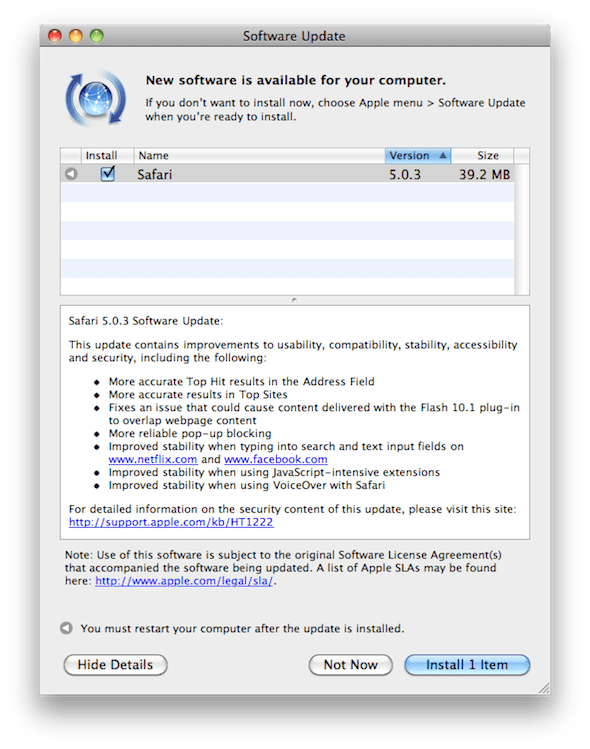


#Safari 5.1.10 mac os x
Safari 2.0 which was released on April 29, 2005, was the sole browser Mac OS X 10.4 offered by default. His experiment beta passed the Acid2 rendering test on April 27, 2005, marking it the first browser to do so. In April 2005, Engineer Dave Hyatt fixed several bugs in Safari. Safari's predecessor, the Internet Explorer for Mac, was then included in 10.3 as an alternative.
#Safari 5.1.10 manual
On Mac OS X v10.3, Safari was pre-installed as the system's default browser, rather than requiring a manual download, as was the case with the previous Mac OS X versions. Later that date, several official and unofficial beta versions followed until version 1.0 was released on June 23, 2003. Apple released the first beta version exclusively on Mac OS X the same day. On January 7, 2003, at Macworld San Francisco, Apple CEO Steve Jobs announced Safari that was based on the company's internal KHTML rendering engine fork WebKit. For over a year, it was privately referred to as 'Alexander', which means strings in coding formats and 'iBrowse' prior to Safari was conceived. īefore the name Safari, a couple of others were drafted including the title 'Freedom'. In May 2000, Microsoft ultimately released a Mac OS X edition of Internet Explorer for Mac, which was bundled as the default browser in all Mac OS X releases from Mac OS X DP4 to Mac OS X v10.2.
#Safari 5.1.10 for mac
In these periods, Microsoft announced three major revisions of Internet Explorer for Mac which were used by Mac OS 8 and Mac OS 9, though Apple continued to support Netscape Navigator as an alternative. It was later replaced by Microsoft's Internet Explorer for Mac within Mac OS 8.1 under the five-year agreement between Apple and Microsoft. Prior to 1997, Apple's Macintosh computers were shipped with the browsers Netscape Navigator and Cyberdog. Pictured from left to right: Netscape Navigator, Cyberdog and Internet Explorer for Mac were the predecessors of Safari. Safari is now used by 9.61 percent percent of desktop computers worldwide. In May of 2022, according to StatCounter, Apple's Safari dropped to the third most popular desktop browser after being overtaken by Microsoft's Edge. The Safari Developer Program, which granted members the privilege to develop extensions for the browser was available for $USD 99 per year.
#Safari 5.1.10 software
It received criticism for its approach to software distribution and its past limitations of ad blockers. In the Pwn2Own contest at the 2008 CanSecWest security conference, Safari caused Mac OS X to be the first OS to fall in a hacking competition. The fifteenth version (July 2021) is the current revision, featuring a redesigned interface.Īpple used a remotely updated plug-in blacklist license to prevent potentially dangerous or vulnerable plugins from running on Safari. The fourteenth version, released in November 2020, was 50% faster than Google Chrome, and consumed less battery than other standard competitors. The thirteenth version included various privacy and application updates such as the FIDO2 USB security key authentication and web Apple Pay support. In the eleventh version (September 2017), it added support for Intelligent Tracking Prevention. The fifth version (June 2010) introduced a less distracted page reader, extension and developer tools it was also the final version for Windows. The third generation (January 2007) brought compatibility to the iPhone via iPhone OS 1, while the Macintosh edition was topped with the fastest browser performance at that time. Safari was introduced within Mac OS X Panther in January 2003, and as of 2021, has progressed through fifteen major versions. It is supported on macOS, iOS, and iPadOS a Windows version was offered from 2007 to 2012.

It succeeded Netscape Navigator, Cyberdog and Internet Explorer for Mac as the default web browser for Macintosh computers. It is primarily based on open-source software, and mainly WebKit. Safari is a graphical web browser developed by Apple.


 0 kommentar(er)
0 kommentar(er)
